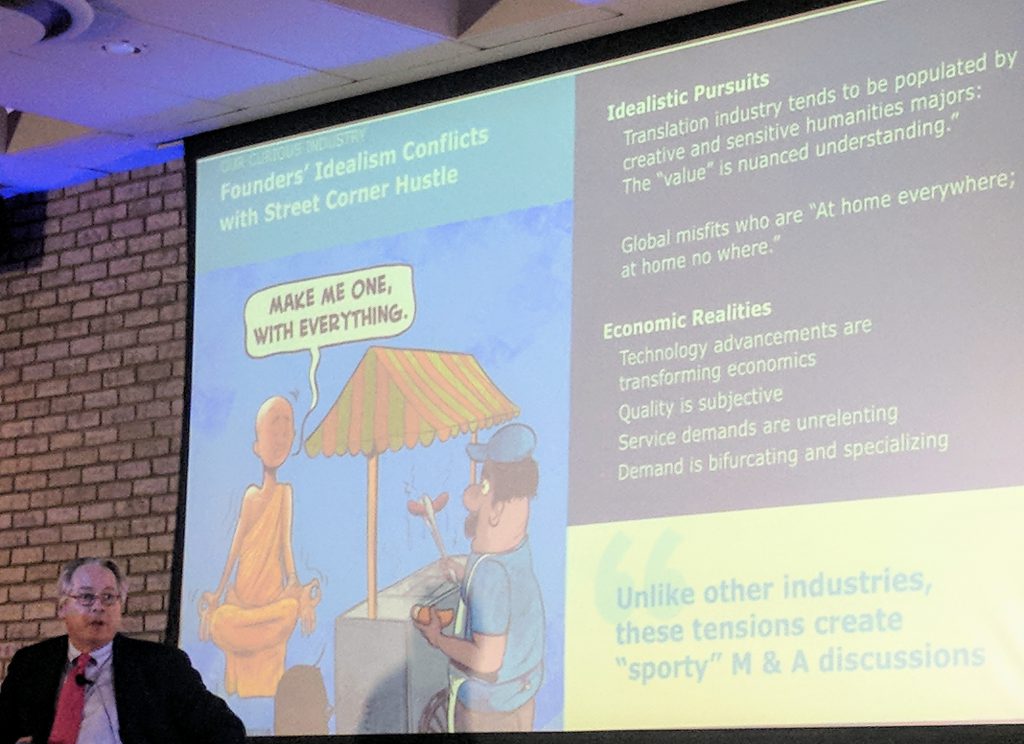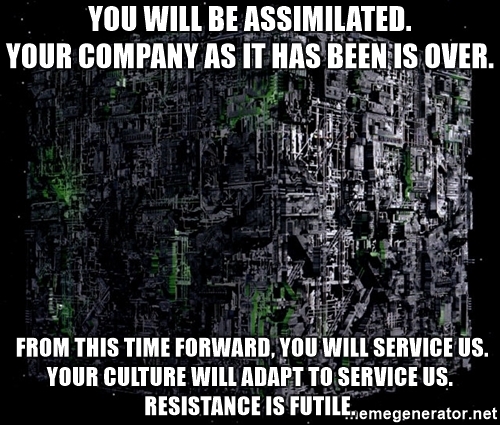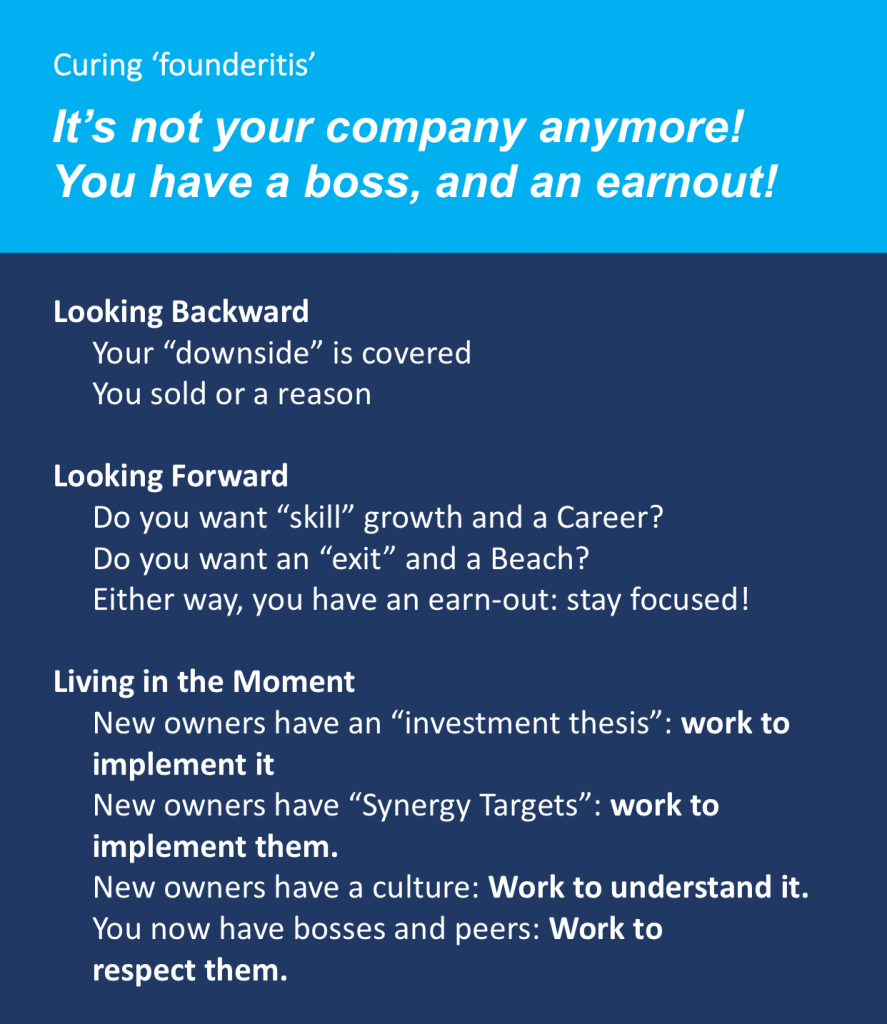Your inability to stop us from sucking is a failure of leadership.
Gilfoyle (of course) to Richard Hendricks.
Your inability to stop us from sucking is a failure of leadership.
Gilfoyle (of course) to Richard Hendricks.
Unable to make GALA 2018 in Boston? Feeling the #FOMO for #GalaBoston18?
Let me quote Renato Beninatto and Tucker Johnson recent book:
Virtually any product or service in the world can be replaced by a substitute.
They continue:
Take away your iPhone, and you will spend more time on your computer. Take away Renato’s car, and he’ll substitute it by taking the bus. Take away Tucker’s coffee, and he’ll substitute it with a sharp knife in your throat. All of these changes would suck horribly, but we would survive.
(Except perhaps the despicable person who took away Tucker’s coffee.)
This may be a controversial statement, and Renato may disagree (and potentially given the above, Tucker may violently do so), but in this case, a substitute for GALA attendance, to tide you over to next year, could be their book, The General Theory of the Translation Company.
For anyone getting started in the industry, this book highlights the oddities that you wouldn’t expect, while giving a solid primer on how translation companies work. For someone who has spent their career in the industry, it gives a coherent structure for understanding experiences and shaping conversations around them. And it probably will make you think about a few things you’ve taken for granted.
1. On what translation companies do:
“LSPs [language service providers] do not provide translation; they provide vendor management, project management, and sales.”
This is one of those obvious things that people outside the industry don’t realize. But it’s fundamental to the way the industry operates – with translation largely outsourced, but the core functions they list kept in-house.
2. On the eternal battle between project management and sales:
“The project management function is the single most important part of the entire language services provider.”
YET
“The language services industry is a very small industry with a high degree of emphasis on brand equity. Your salespersons are your primary brand equity ambassadors. They have the power to greatly influence your reputation within the industry for better or for worse.”
Renato started out in sales. Tucker in project management. So, it’s not surprising their description of each is heroic. Yet…I can’t disagree with either. Without strong project management (which extends beyond the production side to client intake and program management), the best sales person will churn through clients. The best way to grow a business is though keeping your current clients coming back. But the second best way to grow is to have strong sales people getting your company well-positioned as each new deal comes into focus. And that skill is often rare.
3. On skepticism of the the promises of automation:
“A fully automated process has long been the sought after Holy Grail of the industry.”
YET
“Taking advantage of the technology that is available today, a single project manager can efficiently handle the work that would have taken 10 project managers as recently as a decade ago.”
The diagram below comes from their book as well – and it illustrates neatly the difference good project management software can make. Instead of project managers serving as email traffic cops, they monitor for the exceptions – which are what take up most of the time. And the exceptions are also what make the “fully automated process” this mystical faraway goal that always seems on the horizon. Current technology can makes things much easier most of the time, but people still need to deal with the exceptions which happen every day.

4. On the exit plans of translation company CEOs:
“We haven’t seen it yet but one day we would love to see an honest company unveil their new corporate mission statement that is just a bunch of green dollar signs followed by smiley face emojis. Or perhaps a Vision Statement that includes the CEO’s dream of one day owning a vacation home in Malta.”
Rory Cowan described much the same thing in his SlatorCon 2017 New York presentation explaining that many top execs just want “to exit and sip Mai Tais on the beach.”
Renato and Tucker made it very clear that there was a lot of dynamism:
What happens when the language services industry is squeezed? Well, mostly the same thing. People get laid off. People look for new jobs. People dream of going into business for themselves. But because of the very low barrier to entry in the industry, those people who are contemplating starting their own business actually have the power to do so.”
And yet, they describe a fundamental weakness:
Very few people actually know anything about the language services industry except for those of us in it…
There is a Catch-22 at play here. Nobody reports on the industry because it is not well understood and it is not well understood because nobody has taken the time to report on it. What this means is that the only people who are reporting on it are those from the industry, since they are the only ones who understand it properly. This can be problematic for two reasons…
Industry insiders are often reluctant to be critical of other players in the industry, for fear of rocking the boat too much… [which leads to] a deficit of any meaningful or actionable new information or insight into the language services industry…
You would be hard pressed to get too many industry insiders to admit it in mixed company, but this lack of outside analysis is a serious threat. The resulting groupthink compromises the credibility of the industry and serves to limit both the amount and quality of information available on the industry even further.
The dynamism is what leads to so many small companies that do well enough to create exits for their founders. And it leads to a lot of dynamic individuals driving the industry. But the lack of outside understanding and analysis – evident in many of the Silicon Valley tech startups that seem focused on theoretical problems divorced from the reality of the industry – leads to a kind of stagnation. Ideas that would probably work, but failed miserably are often passed on for years longer because the industry is insular.
I appreciate that through Nimzdi, their consulting company, Renato and Tucker are trying to address this issue. I especially commend their Nimzdi 100 for not just providing a handy list that was sort-able and easy to find, how they accounted for things such as “language services business units inside larger corporations,” but most of all for how accessible they made their data – with their raw data able to be downloaded by other analysts.
In the past year, between Slator, Nimdzi, and even a subreddit dedicated to the translation business, the translation industry is beginning to open up it’s information more to outsiders. Which – as Renato and Tucker say – is to the good.
So, what are the 5 top things that people learned from GALA this year?
[Seinfeld] had a gem of a leverage technique he used on himself and you can use it to motivate yourself… a unique calendar system he uses to pressure himself to write. Here’s how it works.
He told me to get a big wall calendar that has a whole year on one page and hang it on a prominent wall. The next step was to get a big red magic marker.
He said for each day that I do my task of writing, I get to put a big red X over that day. “After a few days you’ll have a chain. Just keep at it and the chain will grow longer every day. You’ll like seeing that chain, especially when you get a few weeks under your belt. Your only job next is to not break the chain.”
“Don’t break the chain,” he said again for emphasis.
***
It works because it isn’t the one-shot pushes that get us where we want to go, it is the consistent daily action that builds extraordinary outcomes.
I’ll credit the author of the Lifehacker piece, Gina Trapani – she cites as her source the developer Brad Isaac – who sources Jerry Seinfeld. This is as well-sourced as a Michael Wolff story, but the truism at the heart is probably just as valid.
I just bought a 2018 wall calendar myself and am tracking my number one daily goal on it.

Seinfeld has a great quote in a 2012 New York Times article explaining an ex post facto justification for this method:
If I don’t do a set in two weeks, I feel it…I read an article a few years ago that said when you practice a sport a lot, you literally become a broadband: the nerve pathway in your brain contains a lot more information. As soon as you stop practicing, the pathway begins shrinking back down. Reading that changed my life. I used to wonder, ‘Why am I doing these sets, getting on a stage? Don’t I know how to do this already?’ The answer is no. You must keep doing it. The broadband starts to narrow the moment you stop.
The things that matter, that will change your life, you need to do every day. EVERY day. And that is how you will become the best. Because…it’s the only way.
Kevin Systrom, one of the co-founders of Instagram, ended his NPR “How I Built This” with an interesting theory about life and success:
I have this thesis that the world runs on luck. The question is what you do with it.
Everyone gets lucky for some amount in their life. And the question is, are you alert enough to know you’re being lucky or you’re becoming lucky?
Are you talented enough to take that advantage and run with it? And do you have enough grit, enough resilience, to stay with it when it gets hard?
Because everyone gets lucky in minimal ways every week. You find a dollar on the ground, you get a break at work to work on a cool project, or you meet someone really interesting. The difference between people who succeed in the long-run and people who don’t is that optimism that you got lucky and now it’s yours to make awesome.
Kenny Rogers had a similar insight on a different level of success:
You’ve got to know when to hold ’em
Know when to fold ’em
Know when to walk away
Know when to run
You never count your money
When you’re sittin’ at the table
There’ll be time enough for countin’
When the dealin’s done
It’s something that comes up again and again. Especially in an organization in the middle of a crisis.
I have always believed that loyalty to a company is superseded by loyalty to people. Because I don’t believe it’s still called loyalty if it’s not a two-way street.
Most companies these days have at-will employment. Their HR teams are meant to protect the company rather than to help you. The sole legal purpose of a company is to provide money to shareholders, and as such, the structures in place are designed to ensure this single objective is followed above all others.
When I come in to work in the morning, it isn’t because I really want to make some shareholders some money. It is because I believe that what I’m doing will make the lives of my colleagues and teammates better. I go in to work because I believe in my manager’s vision of where to go next. I go in to work because I feel loyalty to my colleagues in sales and production and technology and management. I feel loyalty to these people – and that is why I work as hard as I do.
A company can help create these relationships by encouraging entrepreneurship within the organization:
@PhilShawe kicks off #GLNXT explaining the @TransPerfect model: “Find the best people; align incentives; & get out of the way.” pic.twitter.com/gXcMx5cBmK
— Joe Campbell (@j0ecampb3ll) September 28, 2017
I have felt empowered here at TransPerfect thanks to my manager, Phil; my colleagues in production whose client focus is second to none; my partners in sales with whom I’ve built relationships of mutual trust as we created client solutions; my fellow technology leaders and experts across the company who have overperformed day after day; and most of all, my team, who each day inspires me to be better. TransPerfect has created something special in how it has empowered so many people. And that is one the main reason why I have found value at TransPerfect. Because in my personal experience, for much of my time here on the tech side, promotions were deserved and incentives were tied to success. I was able to carve out my small portion of the TransPerfect dream.
Conflating the loyalty you hold towards your colleagues to the loyalty to a company is a confusion of category. Though it is in some people’s interests to do so, it’s a game of two card monte. As Upton Sinclair wrote:
It is difficult to get a man to understand something when his salary depends upon his not understanding it.
My loyalty lies with my team, my colleagues in sales, production, technology, and the rest of those I work with.
Because in the end, that’s where loyalty should lie – with those who have helped make you successful. Those with whom you have formed partnerships – either as a manager, a colleague, or a subordinate.
This loyalty is a two-way street. It is earned and deserved. And TransPerfect has long been the beneficiary of the system of loyalties it allowed to flourish. And I have been fortunate enough to find many colleagues who earned my loyalty, and to whom I have given mine in turn.
Because you can’t be both.*
I propose 3 questions that determine the difference.
If you are a manager, then your actions are under extra scrutiny. People will notice when you say one thing, but do another. The quickest way to demoralize your employees is to be a hypocritical boss rather than a leader with integrity.
If you’re a boss, you may expect your employees to work late, while you go home early. You may take holidays that you don’t give them.
A leader and boss may say the same words, but their employees know the difference. And the exact same words have a markedly different effect.
When a boss talks about promoting “a collaborative workplace culture” as they act dictatorially, it saps at morale. When a leader encourages open dialog and collaboration and brings employees into decisions, it boosts it. When a boss brags about “protecting their team” even as they publicly criticize them as underperformers, the hypocrisy is clearly telegraphed and undermines faith in the enterprise.
Everyone with a certain level of success can amplify their voice. Even Bill Cosby has a PR team. But having a real vision that can motivate people is something special. Many managers simply don’t have it. They may ask their employees for ideas, and then take the credit for them. They may jump from one idea to another without regard for the consequences. These are signs that a manager has become a boss rather than a leader.
A leader on the other hand has a vision of the future. It may change and evolve with conversation and collaboration. It will have to grow if it is to succeed. But it’s there. You can see the light in their eyes when they talk, the excitement in their voice. A leader can authentically persuade people to buy into their vision.
Others may pose as leaders – while making clear they aren’t – insisting that they persuade their teams by exercising “authority” through use of “positional influence without being seen as dictatorial.” In the end, the game is given away by the phrasing: “Don’t be seen as dictatorial” is something a PR team tells you…that you aren’t supposed to say out loud.
In public though, a PR team is a decent way to paper over this difference – but in private, it’s almost impossible to motivate a team by pointing to news clippings. Especially when they are contradicted by your own behavior.
A manager needs to understand that they are in a position of power over their employees. And that that position can easily be abused. Words said by a manager carry extra weight to their employees. Self-awareness is a key aspect of the emotional intelligence required to be a good manager. As Sharron Adler wrote:
It is not the monsters we should be afraid of; it is the people that don’t recognize the same monsters inside of themself.
A leader needs to be aware of their own monsters – for if they only see monsters in others, it’s certain theirs are running wild.
Leaders acknowledge this and go the extra mile to make sure that their employees know that they don’t consider themselves intrinsically better. They realize that being a manager is a privilege. And that their teams aren’t just necessary props who can be “replaced” or “upgraded” but are owners and drives of the leader’s own success. They bring them into the process. They trust them and empower them with actions, instead of just words.
A boss on the other hand will declare that their success is self-made. And not realize the slight this gives to everyone who works with them. A boss will take every opportunity to demonstrate their power, at worst through bullying and harassment. A boss will see a line waiting to go up to the elevator and decide against basic rules of fairness that they have the authority to walk to the front and cut that line. This lack of self-awareness leads to toxic behavior.
***
The little things people do are noticed. They make an enormous impact – far more than PR agents ghostwriting. Those whose images are pristinely kept in public, hiding monsters within, are those who fall hardest when truth outs, as it does eventually.
***
Rory Cowan gave a fascinating presentation at SlatorCon on October 12, 2017 entitled, rather enigmatically, “A Seller’s Journey from a Buyer’s Perspective.”
@Lionbridge‘s Rory Cowan wants to “cure founderitis” in translation industry #slatorcon. Says talk meant for founders in the room. Hmmmm pic.twitter.com/PSslyvIDm3
— Joe Campbell (@j0ecampb3ll) October 12, 2017
He framed his talk as a guide for founders and translation company owner-operators. But in an industry fraught with mergers and acquisitions, it had lessons for everyone.
Cowan gave this talk from a position of unique insight. He founded Lionbridge in 1996 and led it as CEO through 20 acquisitions. In 1999, he brought the company public. And then he brought it back private again in a sale to the private equity firm H.I.G. in 2017. (I met Rory when he first arrived at SlatorCon, and with a smirk, he introduced me to a fellow from H.I.G. who happens to also be on the Board of Directors.)
Cowan described the translation industry as unique. He said it in a way that you might talk about a talented but frustrating teammate when you’re trying not to offend anyone. He played up this specialness of the owner-operators in the translation industry, declaring that most founders were “sensitive humanities majors” and “global misfits” who lack “street corner hustle.”

Cowan implied that his success at Lionbridge came because he didn’t have one of those “sensitive majors”, but a Harvard MBA. The path he charted for Lionbridge could serve as a primer for the evolution of the trends du jour in the business world…going public, synergy, outsourcing, crowdsourcing, on demand, the cloud, private equity. In contrast, TransPerfect’s success has often come from New York City hustle: the willingness to work harder, figure out how to do things for the first time, and the willingness to invest in people and long-term projects. I think it’s a stretch to attribute all of this to the comparative merits of an NYU versus Harvard MBA, but there’s a reason that most of Lionbridge’s growth has come from what he called “sporty” M&A deals with owner-operators.
Perhaps the most interesting wrinkle with which to analyze his talk….Much of the team that built up Lionbridge left as the sale approached, feeling frustrated and marginalized – several of them to become my colleagues. But…only a few short months after the sale to H.I.G. closed, Cowan stepped down as CEO after 21 years. I understand that many of his closest allies at the company have been let go by the new owner as well. He remains Chairman of the Board.
Cowan said the main question to determine whether you should sell or not was whether you woke up in the morning wanting to go to work. If you don’t, he said, then this was the time to sell – at what he believes is a market peak. He focused on companies that were having trouble scaling – a major problem among the many small to mid-sized companies in the industry. He attributed much of the problem to the founders themselves, as the skill sets that make a small company successful need to evolve in order for the company to keep going. For those struggling, Cowan suggested selling out as a means to cash in and get the help needed to scale.
Cowan emphasized that the process of selling was going to be painful. And it would need to be “endured.” The roller coaster process of Lionbridge’s sale was described in an excellent Slator piece by Florian Faes: as bidder after bidder dropped out, as H.I.G. was accused of “not adequately valuing the company” and “management attention was drained.” The deal did eventually close, but as Florian concluded:
It can be taken as an indication that ownership and top management at leading LSPs consider mega-mergers in the language services industry as difficult to pull off — and post-merger integration, risky.
Cowan gave 3 warnings to any company that might consider being sold. First, be upfront:
Be sure to “Clean up” or proactively disclose all ambiguities before starting process: Buyer WILL find them and they WILL taint value.
Second, there needs to be syzygy, a complementary pairing, between the purchasing company and the purchasee. “Values and culture are paramount,” he stressed.
Third, and the most important thing being purchased, according to Cowan, was “the next tier” of leadership. Buyers need to “risk adjust” the founder’s departure. He explained that this is why it was essential to involve the senior team of the company in the acquisition process. If you don’t, you risk disappointment, he warned.
Given that the industry is filled with founders who own-operate their business, and given that Cowan has acquired 20 such business, and that he was recently acquired only to be pushed out himself…he clearly has a lot of opinions on this topic.
He suggested that buyers should do more than simply price in the founders’ departure: it was better them to leave as a way to cure the “founderitis” that he saw afflicting many companies. Only then were companies able to move “from maternal/paternal leadership to business metrics.”
Addressing the 80-odd members of the language industry, Cowan was brutally honest about the costs of selling out though. Here’s my best attempt to recreate his slide:

(Sort of kidding. Cowan didn’t use a meme – though as Renato and I agree, the translation industry needs more memes…)
This for real is my best attempt to recreate Cowan’s slide:

Cowan makes very clear that founders need to get out in an acquisition – or if they stay, that they should become closer to team leads than the founders they used to be. As a founder who was pushed out of his position and much of his handpicked team fired after being sold, I wasn’t sure whether Cowan meant this as a warning or as a positive. Maybe just a description of reality.
He used a rather Harvard MBA term – “Synergy Targets” – as a soft way of saying something. He was more explicit about culture. I thought he even sounded bitter when he described how a sale destroys the culture you have built up.
The ideal seller in Cowan’s world is someone who wants to “exit” and sip Mai Tais on a beach. Because in the end, the point he tried to emphasize to any prospective seller…selling is about losing control.
Simon Sinek in Leaders Eat Last writes:
Marine leaders are expected to eat last because the true price of leadership is the willingness to place the needs of others above your own. Great leaders truly care about those they are privileged to lead and understand that the true cost of the leadership privilege comes at the expense of self-interest.
Leaders don’t cut the line waiting for the elevator. They don’t threaten their employees. They don’t claim all credit, as if they made themselves successful with hard work.
Leaders don’t get to be leaders because they’re bossy. They realize that leadership, like success, is a privilege, which comes with responsibilities.
But, a shrewd leader realizes:
The point is, invest in your team. They will provide you with better ROI than any other investment. And without them, there is no company.
Jinny Oh, founder of Wander. Read her whole post.
As someone launching a new venture (or reinventing an established one), you are signing up for long days, sleepless nights, and maybe some missed birthday parties. You will hire people who need to believe in you and your idea enough to be willing to make the same sacrifices. To do all this, you have to be crazy enough to think you will succeed, but sane enough to make it happen. This requires commitment, tenacity, and most of all, single-mindedness. When Israeli tank commanders head into combat, they don’t yell “Charge!” Rather, they rally their troops by shouting “Ah’cha’rye,” which translates from Hebrew as “Follow me.” Anyone
Eric Schmidt and Rosenberg, Jonathan in How Google Works (Kindle Locations 837-842). Grand Central Publishing. Kindle Edition.